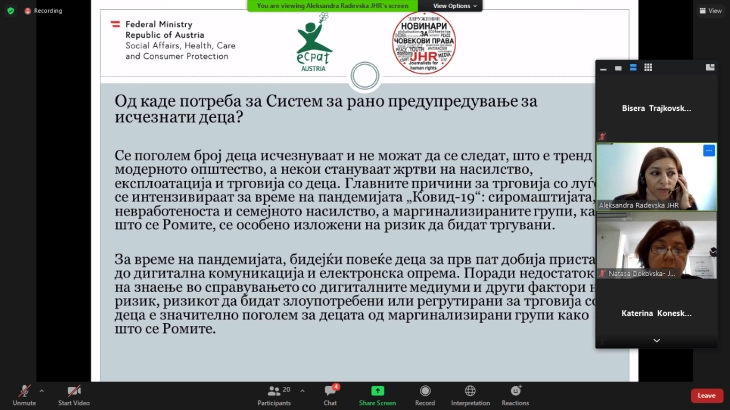Pilot project for early warning system for missing children introduces new methods for prevention, exchange of experiences

Skopje, 13 September 2021 (MIA) – The “Pilot Project for Early Warning System for Missing Children”, which aims to improve existing approaches and find new methods for prevention, investigation and mitigation of trafficking of human beings and children, as well as to protect or strengthen the rights of those affected by exchanging experiences and acquiring new knowledge, was presented at an online event on Monday.
The pilot project is organized by the association Journalists for Human Rights, in collaboration and under project management of ECPAT Austria. It launched on 1 July 2021 and will run through 31 December 2022. The project is funded by the Federal Ministry for Social Affairs, Health, Care and Consumer Protection.
Project coordinator Aleksandra Radevska from Journalists for Human Rights told the event that so far project implementation has been successful and relies on the Austrian experience, as such an early warning system already exists in Austria. She added that similar systems have also been introduced in countries in the region, such as Greece, Bulgaria, Romania and Italy.
The “Pilot Project for Early Warning System for Missing Children” in North Macedonia, Radevska said, includes involving relevant stakeholders, training experts from different contexts, exchange of “good practices”, preparation of regulations, improvement of networks and online security through innovative technologies, development of a tool for online security and piloting of an early warning system for missing children.
“An increasing number of children are disappearing and they cannot be traced, which is a trend of modern society, and some are becoming victims of violence, exploitation and child trafficking. The main causes are: poverty, unemployment and domestic violence, and marginalized groups, such as Roma, are particularly at risk of being trafficked,” Radevska added.
She noted that during pandemic, more children gained access to digital communication and electronic equipment for the first time, which has increased the risk of abuse.
“Due to lack of knowledge in dealing with digital media and other risk factors, the risk of being abused or recruited for child trafficking is significantly higher for children from marginalized groups. Project partners will work together to protect children from disappearing and to prevent from harm those affected,” Radevska stressed.
She underlined that exchange of experiences between stakeholders at institutional, as well as European level, will help identify key innovative tools, such as early warning systems, improve digital literacy and child protection policies, and stress the need to treat children as public stakeholders and that for cross-sectoral cooperation.
“Laws in this field are yet to be harmonized with European legislation. North Macedonia is one of the countries in the region without an early warning system for missing persons,” Radevska added.
ESRAT Austria representative Astrid Winkler expressed during Monday’s event hopes that the project will be successful and stressed the importance of cooperation between stakeholders.
“Austria has focused on campaigns, raising awareness, research and networking. The project is supported by central authorities in charge of combatting human trafficking, as well as experts in the field and we’re also working on setting up a specialized center for trafficking of children,” Winkler said.
A representative of the Federal Ministry for Social Affairs, Health, Care and Consumer Protection, Harald Fugger, stressed support for the initiative, adding that despite challenges, the project can be successful if all stakeholders actively participate in it.
“Congratulations on project implementation, which despite challenges can be successful is all institutions give input. Project implementation will be impossible without support and cooperation with institutions,” Fugger told the event.







